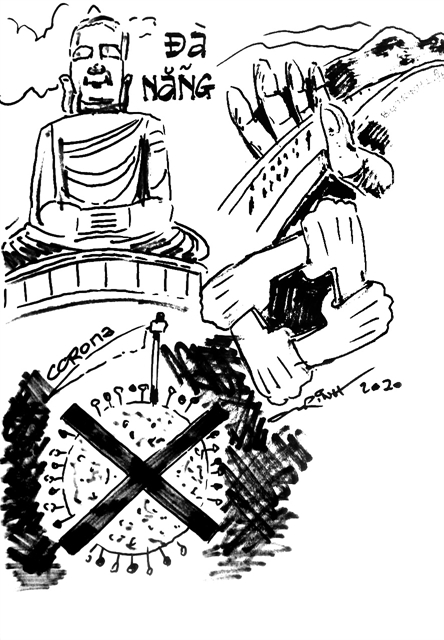 Talk Around Town
Talk Around Town

We should spread messages of support to each other, nothing more, during these troublesome and unpredictable times.

|
| Illustration by Trinh Lập |
by Nguyễn Mỹ Hà
We all knew a second wave of COVID-19 was coming, the only question, really, was when.
It turned out to be last weekend, with the coronavirus finding its way to Đà Nẵng, a beach city of 1.1 million people in the middle of the country, which was dubbed “the most liveable city in Việt Nam” a few years ago.
The first of the new COVID-19 patients, number 416, tested positive three times on July 25: twice at the local Centre for Disease Control (CDC) facility and once at the Nha Trang Pasteur Institute. But it took two more tests at the Hà Nội Pasteur Institute for the Ministry of Health to declare him a patient.
It was a new strain of the virus not encountered before in Việt Nam, the ministry announced two days later. Fifteen or more cases now constitute the rightly-concerning second wave, including patients and their relatives and four health workers at three Đà Nẵng hospitals.
One of the relatives had, unfortunately, returned to his hometown in Quảng Ngãi Province by bus before testing positive.
Đà Nẵng went back into lockdown from noon on July 28. An estimated 20,000 holidaymakers had spent time in the city or in nearby Hội An and then headed home to Hà Nội or HCM City in the weeks prior, according to an online network bringing together health workers, media leaders, and lawmakers to take on the pandemic.
So we’re back to alert mode once again. Wear a face mask when outdoors and wash your hands with soap regularly for 20 seconds.
The three hospitals in Đà Nẵng are under quarantine, with two patients on ECMO (extracorporeal membrane oxygenation), a heart and lung support system that functions outside of the patient’s body. Only those suffering severe, life-threatening conditions are placed on ECMO.
A team of specialists from HCM City’s Chợ Rẫy Hospital has arrived in the central city to provide medical consultancy to local doctors.
Curiously, it seems this second outbreak may have its foundation in the illegal trafficking of immigrants through mountainous border areas, who then wind up in major population centres.
Health authorities have been unable to trace “F0”, the source of the outbreak, but recent arrests of Vietnamese and Chinese citizens involved in smuggling people into the country from the north have outraged many.
The overall sentiment has been that such people should be punished severely. For as little as or as much as VNĐ250,000 (US$12), local people have willingly guided illegal immigrants into Việt Nam’s cities and towns.
This indeed represents a health threat in major cities, where population density is high and social distancing has faded in the minds of most in recent weeks, given that the country was fast approaching 100 straight days with no community transmissions.
Only when those involved in the smuggling operations are tested for COVID-19 can health officials rule them out or otherwise as the source.
There hasn’t been much beyond public speculation and finger-pointing so far. With information on the pandemic available quickly in Việt Nam, we all need to be patient, only share information we know to be true, and above all, once again adopt the practices that a few months ago protected us and our extended families from the coronavirus’s first strike.
The fortnight or so ahead will no doubt be hard, and repeats of what we saw at Bạch Mai Hospital in Hà Nội a couple of months ago, when a cluster formed, seem likely. If everyone respects health and safety warnings, then the fight can again be a success. But if people ignore the warnings this time around and adopt a lackadaisical approach to mask-wearing and hand-washing, the outcome will differ from earlier in the year.
The overall message in government announcements has been consistent: we need to keep going, controlling the disease on one hand while cautiously going about our business on the other.
Better instead to spread messages of support to each other, nothing more, during these troublesome and unpredictable times.
Be courageous Đà Nẵng, stay strong and be positive.
To those of you who have returned from Đà Nẵng recently, fill out a health report, restrict your travel and contacts, and take responsibility for your health and the health of those around you.
Together we can overcome these difficult days.
A chartered plane brought 219 people back to Việt Nam from Equatorial Guinea on Wednesday, of whom more than 120 are COVID-19 patients in need of immediate treatment. The total number of infected people around the country stands at less than 500 as I write, but it’s heading upwards.
Our healthcare workers still have a tough time ahead. We can help by staying where we are. VNS